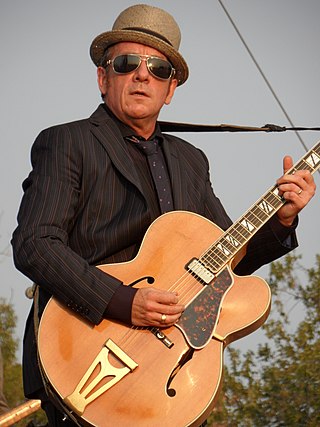
Declan Patrick MacManus, known professionally as Elvis Costello, is an English singer, songwriter, record producer, author and television presenter. According to Rolling Stone, Costello "reinvigorated the literate, lyrical traditions of Bob Dylan and Van Morrison with the raw energy and sass that were principal ethics of punk", noting the "construction of his songs, which set densely layered wordplay in an ever-expanding repertoire of styles." His first album, My Aim Is True (1977), is widely regarded as one of the best debuts in popular music history. It spawned no hit singles, but contains some of Costello's best-known songs, including the ballad "Alison". Costello's next two albums, This Year's Model (1978) and Armed Forces (1979), recorded with his backing band the Attractions, helped define the new wave genre. From late 1977 through early 1980, each of the eight singles he released reached the UK Top 30. His biggest hit single, "Oliver's Army" (1979), sold more than 400,000 copies in Britain. He has had more modest commercial success in the US, but has earned much critical praise. From 1977 through the early 2000s, Costello's albums regularly ranked high on the Village Voice Pazz & Jop critics' poll, with This Year's Model and Imperial Bedroom (1982) voted the best album of their respective years. His biggest US hit single, "Veronica" (1989), reached number 19 on the Billboard Hot 100.

Almost Blue is the sixth studio album by the English singer-songwriter Elvis Costello, and his fifth with the Attractions—keyboardist Steve Nieve, bassist Bruce Thomas and drummer Pete Thomas. It was recorded in May 1981 in Nashville, Tennessee, and released in October the same year. A departure from Costello's previous works, it is a covers album composed entirely of country music songs, including works written by Hank Williams and George Jones. The project originated with Costello's desire to record a collection of covers after his two previous studio albums commercially underperformed following Armed Forces (1979).
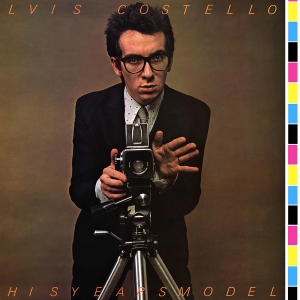
This Year's Model is the second studio album by the English singer-songwriter Elvis Costello, released on 17 March 1978 through Radar Records. After being backed by Clover for his debut album My Aim Is True (1977), Costello formed the Attractions—keyboardist Steve Nieve, bassist Bruce Thomas and drummer Pete Thomas —as his permanent backing band. Recording sessions took place at London's Eden Studios in eleven days between late 1977 and early 1978. Nick Lowe returned as producer, and Roger Béchirian acted as engineer. Most of the songs were written prior to the sessions, and debuted live during the latter half of 1977.
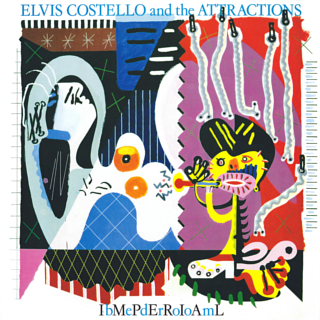
Imperial Bedroom is the seventh studio album by the English singer-songwriter Elvis Costello, and his sixth with the Attractions—keyboardist Steve Nieve, bassist Bruce Thomas and drummer Pete Thomas. It was released on 2 July 1982 through F-Beat Records in the United Kingdom and Columbia Records in the United States. Recording took place at AIR Studios in London from late 1981 to early 1982 with production handled by Geoff Emerick. Placing an emphasis on studio experimentation, the album saw the group use unusual instruments, including harpsichord, accordion and strings arranged by Nieve. Songs were rewritten constantly while Costello tinkered with the recordings, adding numerous overdubs.

Punch the Clock is the eighth studio album by the English singer-songwriter Elvis Costello, and his seventh with the Attractions—keyboardist Steve Nieve, bassist Bruce Thomas and drummer Pete Thomas. It was released on 5 August 1983 through F-Beat Records in the United Kingdom and Columbia Records in the United States. Produced by Clive Langer and Alan Winstanley, the album was Costello's attempt at making a commercial record following years of dwindling commercial success. It was recorded at London's AIR Studios in early 1983 and features contributions from the TKO Horns and Afrodiziak.
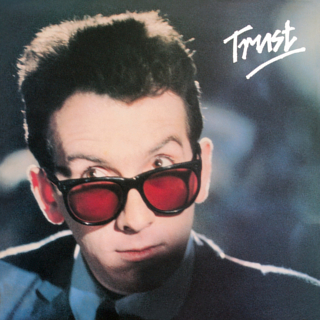
Trust is the fifth studio album by the English singer-songwriter Elvis Costello, and his fourth with the Attractions—keyboardist Steve Nieve, bassist Bruce Thomas and drummer Pete Thomas. It was released on 23 January 1981 through F-Beat Records in the United Kingdom. His fifth consecutively produced album by Nick Lowe, who was assisted by engineer Roger Béchirian, the album was recorded in London from October to November 1980 between DJM and Eden Studios. The sessions were riddled with alcohol and drug issues and tensions were high between the band members. Squeeze vocalist Glenn Tilbrook and the Rumour guitarist Martin Belmont made guest appearances on "From a Whisper to a Scream".
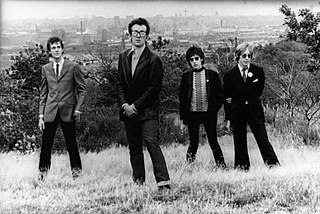
The Attractions were an English backing band for the English new wave musician Elvis Costello between 1977 and 1986, and again from 1994 to 1996. They consisted of Steve Nieve (keyboards), Bruce Thomas, and Pete Thomas (drums). They also released one album as an independent entity, without Costello, in 1980.

"Oliver's Army" is a song written by Elvis Costello and performed by Costello and the Attractions, from the former's third studio album Armed Forces (1979). The song is a new wave track that was lyrically inspired by the Troubles in Northern Ireland and includes lyrics critical of the socio-economic components of war. Costello had travelled to Northern Ireland and was influenced by sights of British soldiers patrolling Belfast. Musically, the song features a glossy production and a keyboard performance inspired by ABBA, creating a juxtaposition between the lyrics and music that both critics and Costello have pointed out.
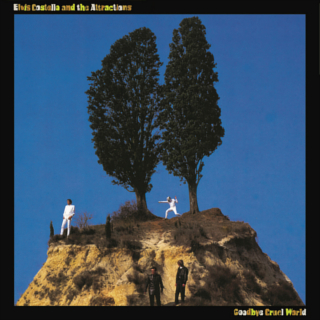
Goodbye Cruel World is the ninth studio album by the English singer-songwriter Elvis Costello, and his eighth with the Attractions—keyboardist Steve Nieve, bassist Bruce Thomas and drummer Pete Thomas. It was released on 18 June 1984 through F-Beat Records in the United Kingdom and Columbia Records in the United States. Produced by Clive Langer and Alan Winstanley, who returned from 1983's Punch the Clock, the album was recorded at London's Sarm West Studios in March 1984 during a period of turmoil for the artist. The problematic sessions included disagreements between Costello and the producers over the album's direction and high tensions amongst the Attractions.
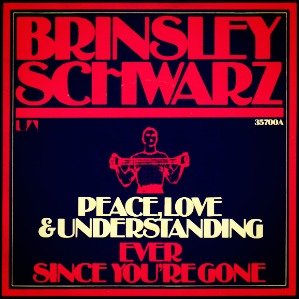
"(What's So Funny 'Bout) Peace, Love, and Understanding" is a 1974 song written by English singer/songwriter Nick Lowe. Initially released by Lowe with his band Brinsley Schwarz on their 1974 album The New Favourites of... Brinsley Schwarz, the song was released as a single and did not chart.

The Best of Elvis Costello and the Attractions is a compilation album by English musician Elvis Costello and his backing band the Attractions, released in 1985. It was the first of what would be many career-spanning compilation albums of previously released material for Costello.

"Pump It Up" is a 1978 song by Elvis Costello and the Attractions. It originally appeared on Costello's second album This Year's Model, which was the first he recorded with the backing group the Attractions. Written as an ironic response to his time during the Stiffs Live Tour and inspired by "Subterranean Homesick Blues" by Bob Dylan, "Pump It Up" features a stomping rhythm and ironic lyrics.
"Almost Blue" is a song recorded by English group Elvis Costello and the Attractions from their sixth studio album, Imperial Bedroom (1982). Written by Costello and produced by Geoff Emerick, the track shares the name of the group's previous 1981 studio album. It was released on 2 July 1982 along with the rest of Imperial Bedroom, and would later be included on side two of The Best of Elvis Costello and the Attractions (1985). A traditional pop song, "Almost Blue" contains lyrics that compare a former relationship to a present one.

"From a Whisper to a Scream" is a song written by new wave musician Elvis Costello and performed by Costello and the Attractions on their 1981 album, Trust. With lyrics referencing drinking, the song notably features a guest vocal from Squeeze frontman and songwriter Glenn Tilbrook as well as a guitar part from ex-Rumour guitarist Martin Belmont.

"You Little Fool" is a song written by new wave musician Elvis Costello and performed by Elvis Costello and the Attractions on their 1982 album, Imperial Bedroom. The lyrics detail a teenage girl's romantic encounter with an older man.

"The Only Flame in Town" is a song written by new wave musician Elvis Costello and recorded by Costello with his backing band the Attractions. The song appeared on Costello's 1984 album, Goodbye Cruel World. Originally written in the style of a classic torch song, "The Only Flame in Town" was reworked by producers Clive Langer and Alan Winstanley in a more pop-friendly style. This final version features Daryl Hall of Hall & Oates on backing vocals.
"New Lace Sleeves" is a song written by new wave musician Elvis Costello and performed by Costello and the Attractions for his 1981 album Trust. The first version of the song was written by Costello in 1974 and featured post-war themed lyrics that were largely scrapped in the final recording. In the final version of the song, Costello included lyrics about seduction and power. Musically, the song was performed at a slower tempo and features a band performance praised by Costello. Pete Thomas notably performed a drum beat inspired by songs from Devo and Stevie Wonder.

"Green Shirt" is a song written by new wave musician Elvis Costello and recorded by Costello with his backing band the Attractions. The song appeared on Costello's 1979 third album, Armed Forces. Lyrically inspired by the influence of the National Front and the Quisling Clinic in Wisconsin, "Green Shirt" features a vocal recorded by Costello after a "night of carousing".
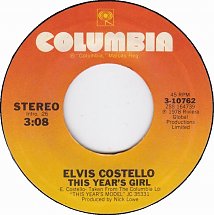
"This Year's Girl" is a song written by new wave musician Elvis Costello and performed by Costello and the Attractions for his 1978 album This Year's Model. Inspired by the Rolling Stones song "Stupid Girl", the song's lyrics criticizing fashion saw some critics allege misogyny, a theme which Costello strongly denied was present in the song in subsequent interviews.
"The Other End (Of the Telescope)" is a song by American band 'Til Tuesday, which was released in 1988 on their third and final studio album Everything's Different Now. The song was written by Aimee Mann and Elvis Costello. Costello recorded his own version of the song for his 1996 album All This Useless Beauty.

















